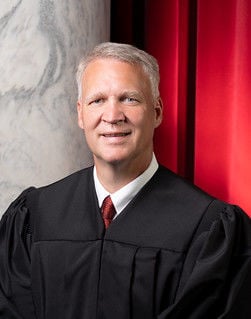The death of West Virginia Supreme Court Justice Tim Armstead at the age of 60 is nothing short of tragic. The Elkview resident was a good public servant lost far too soon.¬Ý
Armstead had been dealing with cancer for about a year and died Tuesday after a brief hospitalization.¬Ý
He was first appointed to the Supreme Court in 2018 during a time of massive turmoil. The court was embroiled in an ethics scandal that involved lavish spending, and the Legislature launched an effort to impeach the entire bench. Armstead was speaker of the House of Delegates at the time -- the first Republican to hold the post in more than eight decades. Knowing he would likely run for a seat on the court in 2020, Amrstead made the ethical decision to remove himself from impeachment proceedings. Such a simple move seems almost more than gracious in light of today's political atmosphere in ¬“¬◊ƒ⁄…‰ and around the nation.¬Ý
Armstead didn't have to wait until 2020 to join the court. He was appointed to the bench in 2018 after the scandal forced two resignations. That same year Armstead won an election to keep his seat through 2020, then won reelection to a full, 12-year term that year.¬Ý
At the time, Armstead's appointment to the court by Gov. Jim Justice was seen by many as a political move, especially considering Armstead had not spent much time practicing law in a courtroom. Justice himself touted it as a move to install a conservative on the court.¬Ý
To his credit, Armstead put politics aside, once elevated to the bench.¬Ý
"I think the place for political policy is in the Legislature, in making the policy," he told the Gazette-Mail when he was first sworn in. "I think, when those policies come to us for review, we should look at what the Legislature intended those laws to say and apply them to the facts in a fair and impartial way."¬Ý
In his own way, Armstead did a lot to help restore trust in the court.¬Ý
Prior to joining the bench, he had served in the Legislature going all the way back to 1998. He became speaker in 2015, when Republicans took control of the House for the first time since about 1932. We didn't agree with all of the policies he pursued, passing a right-to-work law chief among them.¬Ý
Having said that, Armstead was not the type of elected official who was embittered by differences of political philosophy. He largely pursued policies he believed in and, in fact, was a strong proponent of ethics in state government. As West Virginia Watch noted, Armstead headed up multiple pieces of legislation during the 2016 session that upped the ethical standards for government officials, some of which passed the House unanimously.¬Ý
Indeed, Armstead was respected across the aisle.¬Ý
“I had the honor of serving under Speaker Armstead in the minority party. He was a man of deep faith, strong convictions, and quiet dignity,” Delegate Mike Pushkin, D-Kanawha, who also is president of the state Democratic Party, said in a statement issued Tuesday. “As Speaker, he worked hard to foster an environment of collegiality and respect. He viewed public service as a high honor, and his example reflected that commitment.”
Armstead was the embodiment of a time in governance when ideas might've differed, but opposing sides were not demonized. Hopefully, reflection upon his legacy will cause reflection on the value of such an approach.¬Ý












